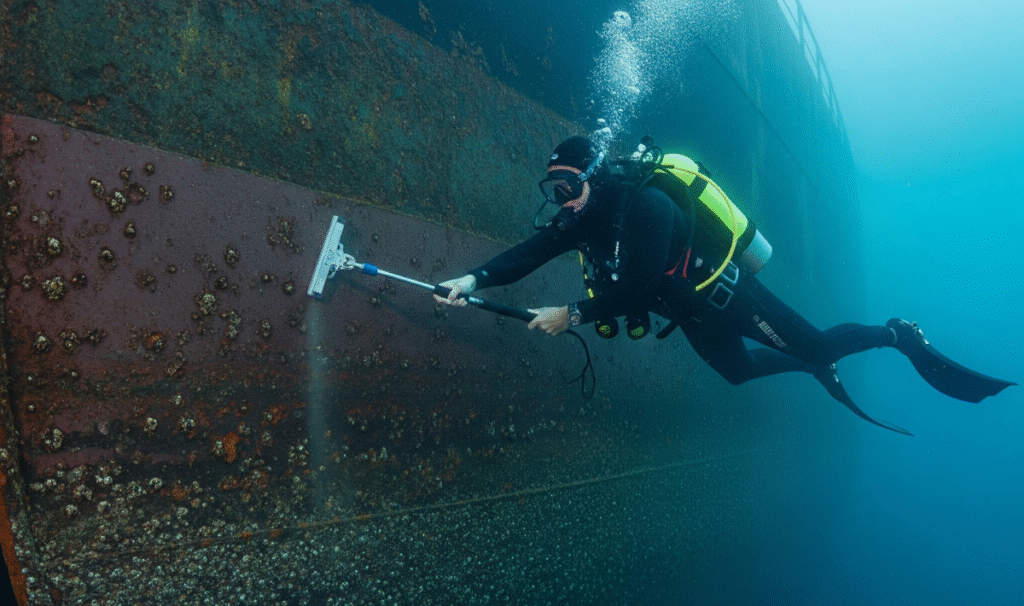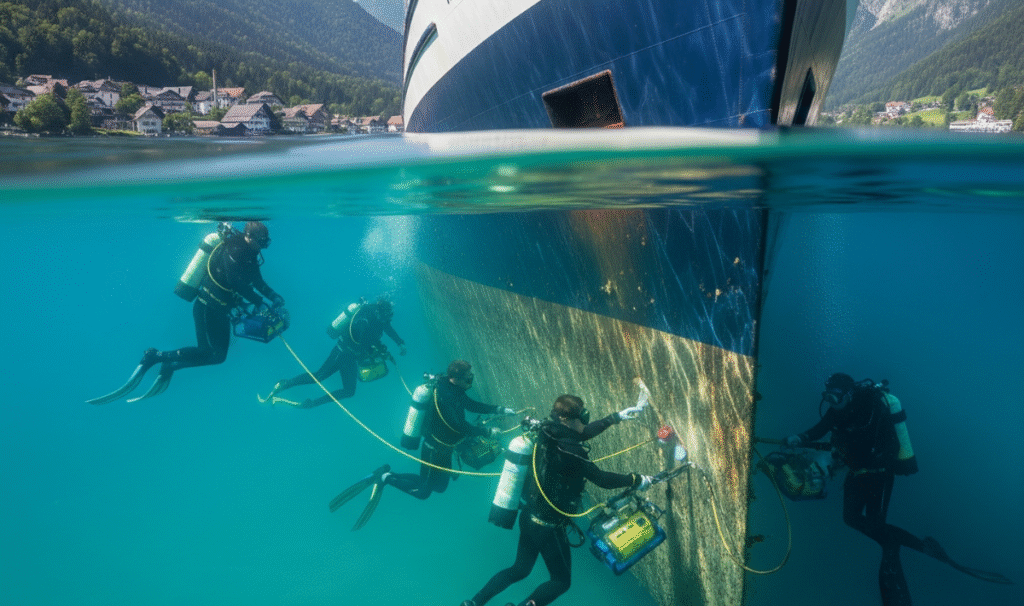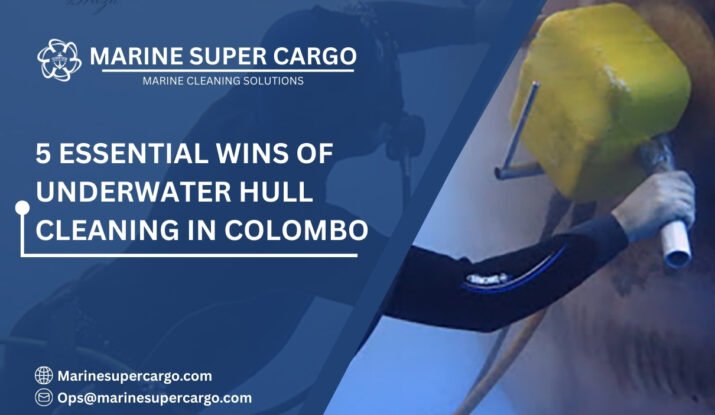If your vessel calls on Sri Lanka’s capital or steams the Indian Ocean lanes, underwater hull cleaning in Colombo is far more than a routine—it’s your ship’s ticket to efficiency, savings, and global compliance. Picture your hull as a sleek glove slicing through tropical water, but let fouling accumulate, and it’s like running in boots filled with sand. In this comprehensive guide, we’ll unravel why regular hull cleaning in Colombo is crucial, how it’s expertly done, and how you can choose the best service for your vessel and crew.
Why Underwater Hull Cleaning in Colombo is Essential
Colombo is one of South Asia’s busiest marine hubs, seeing countless commercial and leisure vessels transit every day. In tropical, nutrient-rich waters, marine organisms such as barnacles, algae, and mussels grow fast. Regular underwater hull cleaning in Colombo ensures your vessel:
- Maintains optimal speed and maneuverability
- Avoids burning extra fuel (sometimes 10–20% more!)
- Prevents premature corrosion and hull coating damage
- Meets strict international and local environmental rules

Understanding Colombo’s Unique Marine Environment and Fouling Challenges
The Indian Ocean’s warm currents, steady sunlight, and abundant plankton create a paradise for marine fouling. Vessels not cleaned frequently risk barnacle reefs and weed jungles under the waterline, even after a few weeks at anchor. Add in ship layups, port congestion, and variable water quality, and regular hull cleaning becomes mission-critical for every vessel operating in Colombo.
Risks of Neglected Underwater Hull Cleaning in Colombo Waters
Ignoring hull cleaning is like ignoring your car’s oil lamp—problems will compound:
- Rising fuel costs: Even minor fouling rapidly adds up at today’s energy prices.
- Reduced speed and sluggish performance: Crews report losing knots of speed to the “invisible hand” of biofouling.
- Corrosion and damage: Micro-organisms and barnacles can chew through protective coatings and expose expensive metals to saltwater.
- Operational headaches: Poor hull hygiene risks engine strain, clogged intakes, and more time at the dock for repairs.
- Port compliance issues: Sri Lanka and many global authorities require regular proof of biofouling control; skip cleaning, risk fines, or denied entry.
The Step-by-Step Process of Underwater Hull Cleaning in Colombo
Dive Preparation and Safety Protocols
Professional diving teams in Colombo begin with a comprehensive assessment of local tides, currents, and water clarity. Safety is paramount:
- Divers perform equipment checks, review emergency protocols, and ensure clear communication lines.
- In busy Colombo harbour, operations are closely coordinated with the port authorities to avoid interfering with vessel movements.
These practices ensure compliance with MARPOL Annex V, which governs the prevention of pollution by garbage from ships, including hull cleaning debris.
Advanced Tools, Brush Karts, and Technologies Used
Modern underwater hull cleaning in Colombo uses:
- Rotary brush carts and Piccard triple-head brushes for efficient removal of barnacles and slime
- Hydraulic scrapers and non-abrasive pads to avoid hull coating damage
- Underwater CCTV and ROVs (remotely operated vehicles) for real-time inspection, before-and-after documentation, and compliance
- Propeller polishing and anode checks as part of comprehensive maintenance
Debris is captured, or filtration systems are used to contain marine growth, keeping Colombo’s harbors clean and compliant.
How to Choose a Reliable Service of Underwater Hull Cleaning in Colombo
With many providers on the market, look for:
Certifications, Professional Teams, and Local Experience
- DNV/GL, ABS, BV, LR, IRS, or NK class certification shows quality and compliance.
- Divers should be internationally certified, experienced with local conditions, and trained in biosecurity.
- Transparent documentation: Confirm you’ll get video and written inspection reports for records and port authorities.
- Quick-response capability: The best Colombo teams mobilize 24/7 and minimize downtime on tight shipping schedules.
- Additional expertise: Seek firms with master mariners and marine engineers in oversight positions.
Recommended Cleaning Frequency for Colombo Vessels
Given fast fouling rates, many shipowners clean every 1–3 months. Frequency depends on activity, hull coatings, and layup periods—consult your service provider for advice tailored to your vessel.
Environmental Regulations and Responsible Underwater Hull Cleaning in Colombo Practices
Sri Lanka’s ports strictly enforce international maritime regulations to prevent the spread of invasive species and marine pollution. Only certified hull cleaning providers are authorized to operate within Colombo’s port waters. These companies are expected to:
- Use eco-friendly tools and avoid the use of toxic chemicals that could harm marine ecosystems.
- Capture, contain, and safely dispose of all cleaning debris—preventing any pollutants from entering the water.
- Suspend operations and immediately notify authorities if marine pests such as invasive barnacles or fanworms are detected.
- Provide detailed documentation that proves compliance with both Sri Lankan port authorities and global standards.
These practices align with international frameworks like the International Maritime Organization (IMO)’s biofouling and anti-pollution guidelines, ensuring vessels remain both environmentally responsible and legally compliant.
What Does Underwater Hull Cleaning in Colombo Cost?
Prices vary by vessel size, fouling level, and extent of service. As of 2024:
- Expect rates from USD 6–13 per foot for standard hull cleaning, competitive with regional and international ports.
- Additional services (propeller polishing, underwater surveys, class inspections) increase the bill—but can save far more in fuel and avoided downtime.
- Investing in regular, preventative cleaning reduces long-term repair costs and dry-dock needs.
DIY Cleaning vs. Certified Diving Teams: Pros and Cons
While some captains may consider small DIY cleaning jobs beside the pier, most underwater hull work in Colombo should be left to the pros:
- Safety: Harbour currents, poor visibility, and large ship traffic make diving hazardous.
- Quality: Certified divers have the right tools, training, and experience for complex hull forms and coatings.
- Regulatory Peace of Mind: Only certified teams can guarantee compliance, debris capture, and legal documentation.
- Insurance: Many policies require proof of certified underwater maintenance.

The Key Benefits: Efficiency, Savings, and Regulatory Peace of Mind
A clean hull in Colombo unlocks:
- Fuel cost reductions of up to 20% by slashing drag.
- Longer coating and hull lifespan with corrosion kept at bay.
- Faster, more agile handling is essential for busy commercial and leisure operators.
- Early warning for damage or invasive species via regular inspection reports.
- Seamless passage through port inspections and avoidance of regulatory penalties.
Conclusion:
Underwater hull cleaning in Colombo is no longer simply about shiny metal. It is the bedrock for efficient operations, regulatory compliance, and environmental stewardship. With certified local experts, cutting-edge equipment, and a regular schedule, you’ll enjoy faster voyages, significant fuel savings, and peace of mind from port to ocean. Trust your hull to the pros—and set sail with confidence, every time.
FAQ:
Q1. How often should my vessel receive underwater hull cleaning in Colombo?
Most vessels benefit from cleaning every 1–3 months, especially in the tropical Indian Ocean’s rapid fouling conditions.
Q2. Are underwater hull cleaning services in Colombo environmentally safe?
Yes, certified providers use eco-friendly cleaning tools and strict debris containment to meet international and Sri Lankan environmental standards.
Q3. What is the typical cost for underwater hull cleaning in Colombo?
Expect USD 6–13 per foot, with additional fees for complex vessels or extra inspections.
Q4. Can I clean my vessel’s hull underwater myself in Colombo?
DIY is risky and rarely compliant; regulated cleaning must be done by certified professional diving teams for safety, effectiveness, and legal reasons.
Q5. What extra services are available along with hull cleaning?
Many Colombo companies offer propeller polishing, underwater inspections and photography, class surveys, sea chest cleaning, and repairs for a complete maintenance solution.


